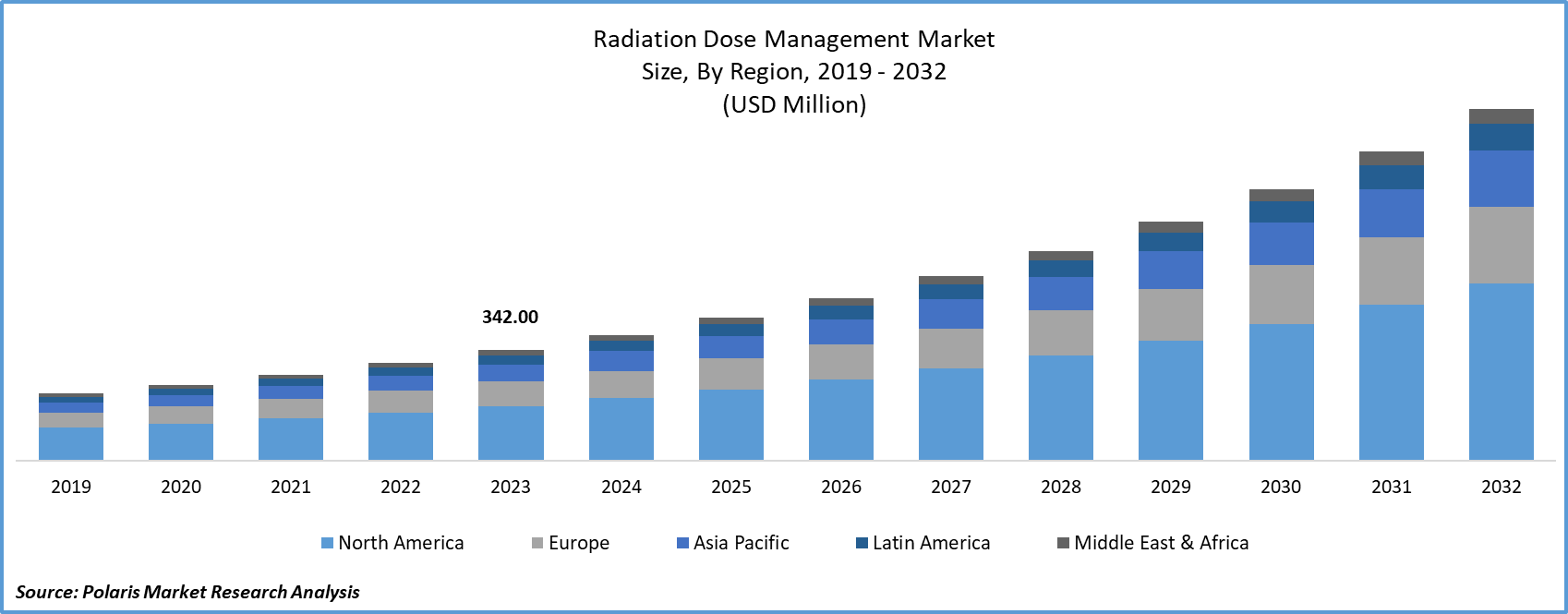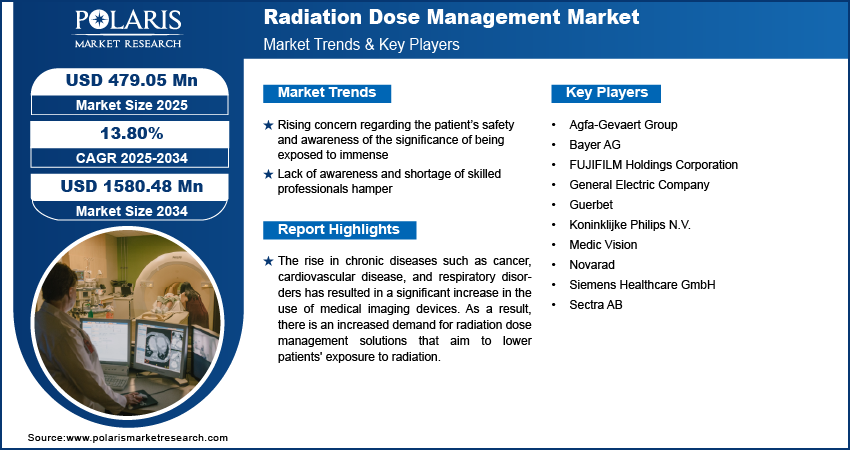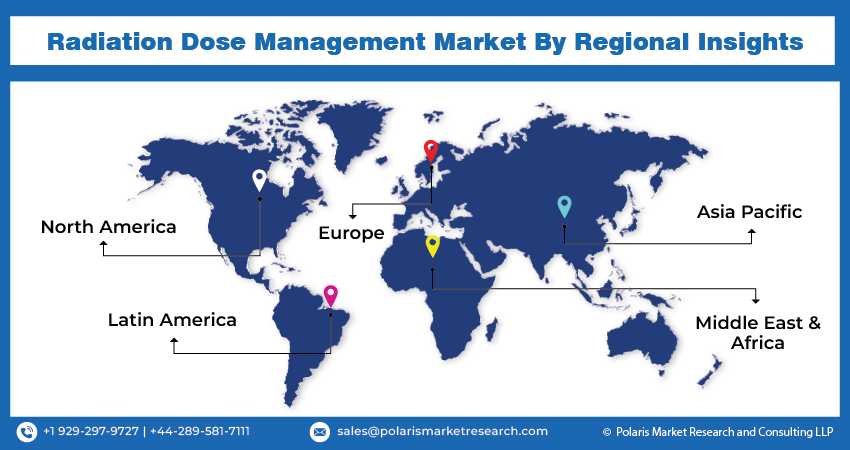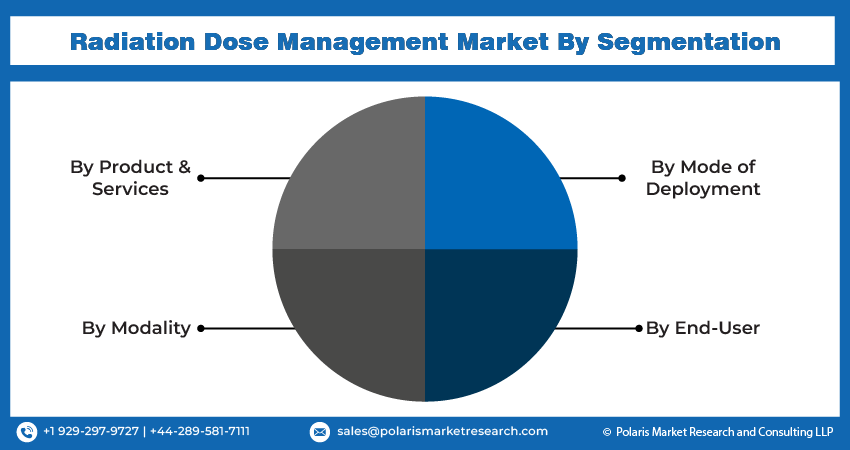
Radiation Dose Management Market Share, Size, Trends, Industry Analysis Report, By Product & Services; By Modality; By Mode of Deployment; By End-User; By Region; Segment Forecast, 2024 - 2032
- Published Date:Jan-2024
- Pages: 116
- Format: PDF
- Report ID: PM4290
- Base Year: 2023
- Historical Data: 2019 – 2022
Report Outlook
Radiation Dose Management Market size was valued at USD 342.00 million in 2023. The market is anticipated to grow from USD 388.11 million in 2024 to USD 1,084.39 million by 2032, exhibiting a CAGR of 13.7% during the forecast period
The research study provides a comprehensive analysis of the industry, assessing the market on the basis of various segments and sub-segments. It sheds light on the competitive landscape and introduces Radiation Dose Management Market key players from the perspective of market share, concentration ratio, etc. The study is a vital resource for understanding the growth drivers, opportunities, and challenges in the industry.
Radiation Dose Management Market Overview
The rise in chronic diseases such as cancer, cardiovascular disease, and respiratory disorders has resulted in a significant increase in the use of medical imaging devices. As a result, there is an increased demand for radiation dose management solutions that aim to lower patients' exposure to radiation.
- For instance, According to WHO's February 2022 report, cancer was responsible for nearly one-sixth of all recorded deaths in 2020, resulting in almost 10 million deaths globally.
Radiation dose management is a medical system that utilizes barriers or technologies to decrease computed tomography (CT) doses and improve the control or mitigation of doses. This system comprises tools to monitor patient exposure, optimize procedures, ensure quality, manage doses effectively, and monitor staff doses in real time. This comprehensive approach benefits radiographers, medical practitioners, medical physics experts (MPE), and other imaging-related healthcare professionals.
Radiation dose management aids in the collection and processing of data, the comparison of data, the generation of reports, and the management of radiation dose information. This system is commonly used in hospitals, imaging centers, and research institutes to estimate the required dose for a procedure and protect patients from excessive radiation exposure.
The radiation dose management market is growing due to technological advancements, the increased usage of interventional imaging and nuclear medicine in medical procedures, greater acceptance of electronic health records, an increasing geriatric population, higher healthcare expenditure, and a growing emphasis on interventional radiology and nuclear medicine. As awareness of the risks of ionizing radiation increases, healthcare providers are adopting radiation dose management solutions to reduce exposure while maintaining image quality. This has driven the growth of the radiation dose management market, with governments also promoting radiation safety in healthcare.

To Understand More About this Research: Request a Free Sample Report
It is essential to keep a close track of the amount of radiation dose given to patients during medical procedures. Overdose can pose a threat to the patients and can even affect the accuracy of scan results. Radiation dose management plays a crucial role in improving radiation protection during medical imaging and interventions. The key responsibilities of dose management include detecting critical events, optimizing radiation doses, and analyzing the quality of imaging.
Radiation dose management systems are extensively used in various medical imaging procedures, including computed tomography, magnetic resonance imaging, and X-rays. They offer several benefits, such as automated registration and administration of patient doses, tracking information on repeated examinations, and the generation of complete dose reports. Managing radiation dose is crucial to prevent the potentially harmful effects of radiation on the human body.
The COVID-19 pandemic has had a significant impact on the radiation dose management market. The increased strain on healthcare systems around the globe has highlighted the importance of efficient and streamlined medical imaging processes, leading to an increase in demand for radiation dose management solutions. These technologies are critical for reducing radiation exposure, ensuring patient safety, and improving overall healthcare efficiency.

Radiation Dose Management Market Dynamics
Market Drivers
- Rising concern regarding the patient’s safety and awareness of the significance of being exposed to immense radiation driving the growth of the market
Increasing concern around patient safety and a better understanding of the negative effects of excessive exposure to radiation drive the growth of the market. As people become more aware of the potential risks associated with medical imaging procedures, it has become extremely important to reduce radiation dosage to ensure patient safety. Consequently, patients are now preferring healthcare providers that use low-dose techniques.
The significance of radiation dose management lies in the fact that high radiation doses can cause DNA damage, which increases the risk of cancer. Low radiation dose management saves lives as well as the money of patients. It extends the life of imaging equipment and reduces the need for additional tests. This reduces the overall cost of healthcare providers. These factors are crucial to the growth of the radiation dose management market.
Market Restraints
- Lack of awareness and shortage of skilled professionals hamper on the market’s growth
The market for radiation dose management is facing significant challenges due to a shortage of skilled professionals and a lack of awareness, which is hindering its potential growth. Proper management of radiation doses is critical in medical imaging and radiation therapy, but there exists a considerable gap in understanding and awareness among healthcare providers and institutions. Many healthcare professionals need to have a complete understanding of the long-term consequences of improper radiation dose management, as it can result in suboptimal patient care and potential health risks. Additionally, the need for more skilled professionals in this field exacerbates the situation, as there is a limited pool of experts capable of implementing and overseeing effective radiation dose management strategies.
Report Segmentation
The market is primarily segmented based on product & services, modality, mode of deployment, end-user, and region.
|
By Product & Services |
By Modality |
By Mode of Deployment |
By End-User |
By Region |
|
|
|
|
|
To Understand the Scope of this Report: Speak to Analyst
Radiation Dose Management Market Segmental Analysis
By Product & Services Analysis
- Radiation dose management solutions held the largest market share in 2023. The rising prevalence of chronic illnesses, increased accessibility to imaging technologies, and increased awareness of radiation-related risks have all contributed to an increase in patient exposure to radiation in the context of medical imaging.
Patients and healthcare providers are increasingly aware of the potential risks associated with radiation exposure. This awareness is driving a demand for effective solutions to reduce these risks. Regulatory mandates have prompted healthcare providers to incorporate radiation dose management solutions into their practices. Additionally, technological advancements have improved the efficiency and cost-effectiveness of radiation dose management solutions, making them more accessible for widespread adoption.
By Modality Analysis
- The computed tomography segment accounted for the highest market share during the forecast period. The high share of this segment explained the increasing prevalence of targeted diseases, like cardiovascular diseases and cancer, for diagnosis and monitoring. Moreover, in order to ensure patient safety and compliance with legislative and accreditation standards, healthcare providers have been compelled to adopt CT scans and implement solutions for managing radiation doses.
By End-User Analysis
- Based on end-user analysis, the market has been segmented on the basis of Hospitals & Healthcare System, Ambulatory Surgery Centers, Diagnostic and Imaging Centers, and Others. The hospitals and healthcare system segment held the largest share of the market. The growth of this segment is ascribed to the increasing acceptance of telehealth and teleconsultation within the healthcare professional community. This aims to ease the burden on healthcare facilities. Moreover, radiation dose management solutions offer convenience by allowing healthcare providers to quickly access patient dose records, facilitate real-time dose exposure, and improve data management. These factors contribute to a heightened adoption of such services among healthcare providers.
Radiation Dose Management Market Regional Insights
North America dominated the largest market in 2023
North America dominated the radiation dose management market, primarily owing to its strong growth fueled by significant investments in healthcare IT and the widespread utilization of advanced radiation software solutions. The region's favorable factors, such as the prominent presence of key industry players and the emergence of startups, are expected to contribute further to the increasing adoption of radiation dose management solutions in the market.
Asia Pacific has witnessed the fastest growth in the market. The growth is attributed to the robust healthcare systems present in the region. Additionally, the widespread availability of cutting-edge radiation dose management devices in countries like India, South Korea, China, Japan, and Taiwan is expected to contribute significantly to the industry's expansion in the Asia Pacific region. The active involvement of key players in the region is also anticipated to play a pivotal role in driving market growth in the region.

Competitive Landscape
The market is characterized by intense competition, with established players relying on advanced technology, high-quality products, and a strong brand image to drive revenue growth. These companies employ various strategies such as research and development, mergers and acquisitions, and technological innovations to expand their product portfolios and maintain a competitive edge in the market.
Some of the major players operating in the global market include:
- Agfa-Gevaert Group
- Bayer AG
- FUJIFILM Holdings Corporation
- General Electric Company
- Guerbet
- Koninklijke Philips N.V.
- Medic Vision
- Novarad
- Siemens Healthcare GmbH
- Sectra AB
Recent Developments
- In November 2023, Qaelum NV and Philips, prominent players in the healthcare and health technology sectors, respectively, partnered to transform the landscape of radiation dose management in the field of medical imaging.
- In March 2023, Milan's Bracco Imaging acquired Blue Earth Diagnostics, a UK-based company that specializes in developing innovative positron emission tomography imaging agents.
- In October 2022, Aspekt Solutions, a medical physics services company, acquired Landauer, a key provider of physics and dosimetry services catering to radiation oncology clinics nationwide. This strategic acquisition positions the combined entities to deliver comprehensive services to diagnostic centers and healthcare organizations throughout the United States.
Report Coverage
The Radiation Dose Management Market report emphasizes on key regions across the globe to provide better understanding of the product to the users. Also, the report provides market insights into recent developments, trends and analyzes the technologies that are gaining traction around the globe. Furthermore, the report covers in-depth qualitative analysis pertaining to various paradigm shifts associated with the transformation of these solutions.
The report provides detailed analysis of the market while focusing on various key aspects such as competitive analysis, product & services, modality, mode of deployment, end-users, and their futuristic growth opportunities.
Radiation Dose Management Market Report Scope
|
Report Attributes |
Details |
|
Market size value in 2024 |
USD 388.11 million |
|
Revenue forecast in 2032 |
USD 1,084.39 million |
|
CAGR |
13.7% from 2024 – 2032 |
|
Base year |
2023 |
|
Historical data |
2019 – 2022 |
|
Forecast period |
2024 – 2032 |
|
Quantitative units |
Revenue in USD million and CAGR from 2024 to 2032 |
|
Segments Covered |
By Product & Services, By Modality, By Mode of Deployment, By End-User, By Region |
|
Regional scope |
North America, Europe, Asia Pacific, Latin America; Middle East & Africa |
|
Customization |
Report customization as per your requirements with respect to countries, region and segmentation |
In today’s hyper-connected world, running a business around the clock is no longer an option. And at Polaris Market Research, we get that. Our sales & analyst team is available 24x5 to assist you. Get all your queries and questions answered about the Radiation Dose Management Market report with a phone call or email, as and when needed.
FAQ's
The global radiation dose management market size is expected to reach USD 1,084.39 Million by 2032
Key players in the market are Agfa-Gevaert Group, Bayer AG, FUJIFILM Holdings Corporation, General Electric Company
North America contribute notably towards the global radiation dose management market
Radiation Dose Management Marketexhibiting the CAGR of 13.7% during the forecast period
The radiation dose management market report covering key segments are product & services, modality, mode of deployment, end-user, and region.

